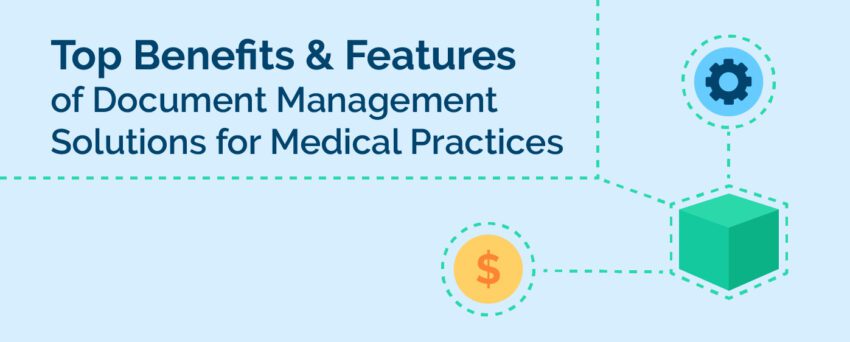12Oct 2023
As the healthcare industry continues to shift into a more digital landscape, it’s more important than ever for medical practices to stay up-to-date on the emerging resources available with today’s technology. When there’s an abundance of sensitive patient information and documents generated on a daily basis, incorporating the use of document management solutions becomes an invaluable and cost-effective tool for efficient record-keeping and retrieval.
A document management system (DMS) can directly improve the overall day-to-day operations of medical practices while also enhancing the quality of patient care.
Regardless of size or specialty, healthcare practices of all kinds should consider benefiting from the improved efficiency, security, and accessibility of patient records accompanied by the implementation of electronic document management software (EDMS).
Challenges of Medical Practices Without DMS
In the healthcare industry, managing patient records and other important medical documents is a critical task. With the increasing volume of patients and the associated sets of data to which they are often tied, maintaining accurate and efficient medical document management has become a daunting and tedious task for many human resources personnel in healthcare. This challenge is further amplified in medical facilities that do not use an automated document workflow system.
Common issues medical practitioners without DMS face include:
- Inefficiency and Delays – Without DMS, medical offices often resort to manual record-keeping methods. This can often lead to inefficiencies as staff members spend more time manually searching for a specific patient’s record or particular document. This not only slows down overall workflow but also causes potential delays in treatment.
- Risk of Errors – Physical files are susceptible to human errors — such as misfiling, duplication, or even loss. These types of errors can have serious consequences. In worst-case scenarios, errors like these could even lead to an incorrect diagnosis, inappropriate treatment, or legal complications.
- Inadequate Security – Without DMS, medical practices may struggle to ensure the security and privacy of sensitive patient records. Physical records can be easily accessed, misplaced, or lost — which can lead to breaches of confidentiality and violations of laws like the Personal Information Protection and Electronic Documents Act (PIPEDA) or Health Insurance Portability and Accountability Act (HIPAA).
- Limited Access and Collaboration – Accessing patient records can become a challenge without a DMS in place, especially for medical practitioners working remotely or across multiple locations. Limited collaboration between healthcare professionals can ultimately impact the quality of patient care.
- Lack of Scalability – As healthcare organizations grow and the number of patients increases, managing physical records can become overwhelming. Without a DMS being used, it becomes increasingly difficult to scale operations efficiently.
- Disaster Recovery – Physical records are vulnerable to damage from natural disasters, fires, or other types of accidents. Medical professionals lack a reliable backup and disaster recovery plan without a DMS, which puts patient records at risk.

Top 5 Features of Document Management Solutions for Medical Professionals
Managing patient information is critical for healthcare providers, and making use of a superior document management solution is a must-have for professional medical offices. An efficient electronic document management system in healthcare offers features such as PIPEDA compliance, workflow automation, cloud-based access, integration with electronic health record systems, and customization options.
These top features for healthcare providers can significantly improve processes and automate workflow:
1. PIPEDA Compliance
Perhaps the most important feature of a document management solution for medical practices is PIPEDA compliance. Healthcare organizations are required to comply with the regulations set forth by these types of privacy acts to ensure that patient data remains secure. A document management solution that meets PIPEDA standards will ensure that all sensitive patient information is protected from unauthorized access.
2. Cloud-Based Access
In today’s fast-paced digital world, the ability to access documents from anywhere in the world is crucial. Rather than relying on physical files, a cloud-based document management solution allows healthcare providers to access patient information from any device with an internet connection. This can be especially helpful for those who may need to access patient records while on-call or out of the office.
3. Workflow Automation
Another valuable feature of a document management system for healthcare industry professionals is the ability to automate workflows. By automating processes such as form filling, approvals, and alerts, healthcare providers can save time and reduce the risk of errors. This is especially essential in busy medical practices where time is of the essence.
4. Integration with EHR Systems
An electronic document management system in healthcare should integrate with Electronic Health Record (EHR) systems. EHR systems can streamline the process of accessing patient data and reduce the risk of errors caused by manually transferring data between systems. Integration also allows healthcare providers to easily attach documents to patient records, such as lab results or insurance information.
5. Customization Options
Every medical practice has its own unique set of needs when it comes to document management. A good document management system for healthcare industry professionals offers customization options to fit the needs of each individual practice. This can include the ability to create custom workflows, define access levels, and customize document templates to ensure that every feature meets the practice’s needs.
Top 5 Benefits of Medical Document Management Solutions
Healthcare professionals can save valuable time and resources by using electronic document management software. From enhanced workflow efficiency to increased document collaboration, a document management solution is a smart investment for any healthcare practice looking for a cost-effective and efficient way to manage medical documents.
Here are five benefits of using a document management system:
1. Reduced Paperwork
Medical facilities can reduce the amount of paperwork they have to deal with each day by digitizing all paper-based documents and converting them into an electronic format. This frees up valuable office space and leads to a more efficient electronic records management system, where medical records, insurance claims, financial documents, and more files can be easily accessed and shared.
2. Improved Document Security
Patient records and other sensitive information require confidentiality, and document management offers a secure solution The importance of using a document management system that provides multiple levels of security is that it ensures only authorized personnel have access to these documents when necessary.
3. Enhanced Workflow Efficiency
Healthcare professionals can automate and simplify the document workflow process with a DMS. These solutions are designed to be user-friendly and reduce the time spent processing documents — increasing the efficiency of the workflows and allowing staff to focus on other important tasks at hand.
4. Increased Collaboration
Another benefit of using document management solutions is that it allows for a high level of document collaboration. Medical practices can share information and collaborate on documents with ease. Staff can work together on the same document in real-time, even if they are in different locations. This feature allows for better communication and ultimately increases productivity.
5. Scanning & OCR Capabilities
One of the other advantages of an electronic document management system is that it has the capability to scan documents and perform optical character recognition (OCR). This allows the documents to be easily indexed and searched for specified keywords. Using this feature, medical practices can quickly locate patient records and other essential documents.
Types of Medical Practices That Need Document Management Solutions
Document management solutions can be beneficial for virtually any type of medical practice. Some specific types that can reap significant benefits include:
- General Practitioners and Family Medicine Practices: Handling a wide array of medical conditions across all age groups, these practices deal with a high volume of patient records.
- Specialty Clinics: Specialty clinics such as cardiology, neurology, orthopedics, and others often need to manage complex patient data. A DMS can help streamline the handling of this information and make it easily accessible for diagnosis and treatment.
- Hospitals and Medical Centers: Large healthcare institutions like hospitals generate enormous amounts of data daily. A DMS can help manage this data effectively, improving productivity and reducing errors.
- Mental Health Practices: Mental health practices often deal with sensitive patient information that needs to be handled with utmost confidentiality. A DMS offers secure storage and access to this information, ensuring compliance with privacy regulations.
- Long-Term Care Facilities: These facilities require accurate and up-to-date patient records to ensure appropriate care. A DMS can aid in maintaining these records and making them readily available when needed.
- Healthcare Compliance Professionals: A DMS can assist with the management of important documents like medical licenses, certifications, and accreditation papers, which are crucial for regulatory compliance.
Implementing Electronic Records Management
Considering the critical role that medical document management plays in healthcare, it is clear that investing in a robust DMS is not just an option, but a necessity for modern medical practices. By doing so, you can ensure better patient care, smoother operations, and streamlined compliance with legal requirements.
In the absence of document management software in medical practices, healthcare professionals are often prone to inefficiencies, errors, security risks, limited access to collaboration, scalability issues, and lack of disaster recovery in their medical document management. Implementing a DMS provides a solution to all these challenges — offering efficiency, improved accuracy, enhanced security, ease of access, scalability, and a solid disaster recovery plan.Get in touch with us today, and we’ll help you customize your own medical document management workflow for your organization.


